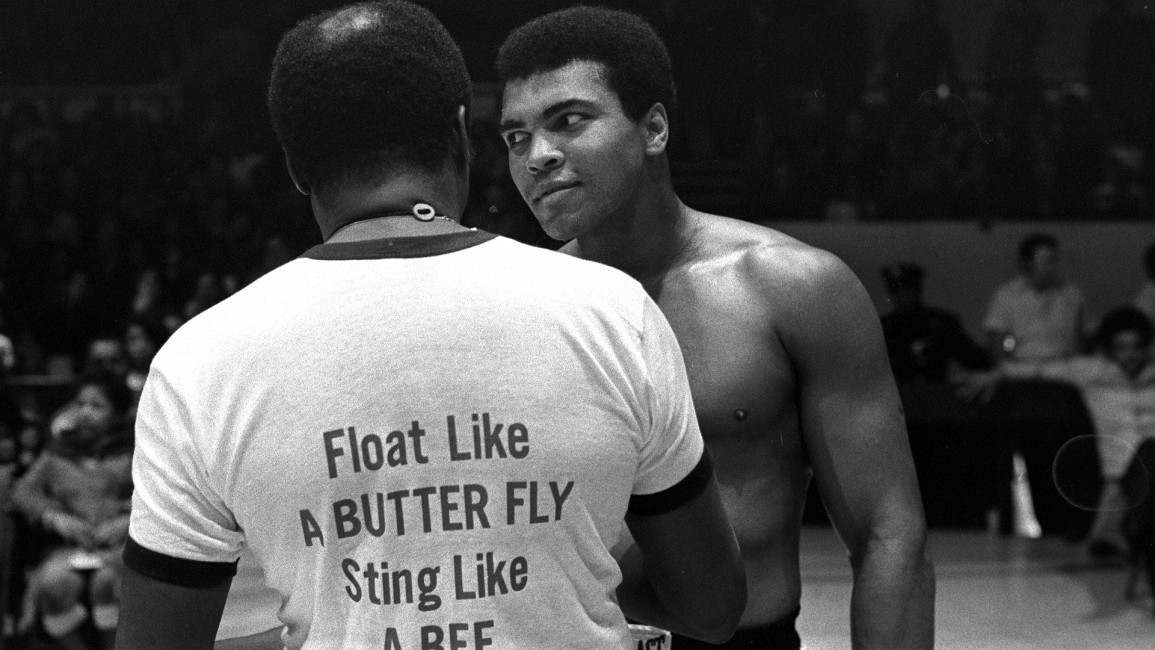
Death of The Greatest: The Arab world reacts
Whether world-leaders, sports heroes, famed authors or any twinkle in a constellation of star celebrities, almost anyone with a public presence queued to add to the mass outpouring of grief and admiration for the boxer.
But loudest of all was the surge of comments from the public at large testifying to the very personal way Muhammad Ali seems to have touched so many across the world.
As the world mourned him, the Arab and wider Muslim Twitterati took their grief online with hashtags created to remember the boxing legend quickly trending.
Cleary Muhammad Ali, whose self-labelling as the "Greatest of All Time" was gladly accepted by his legion of admirers, was many things to many people.
For a person whose reputation and influence was so widespread, we take a look at how social media users, religious scholars and political commentators across the Arab world, of different political stripes and ideological hues, reacted to Ali's passing.
Ali the Muslim
A proud Muslim whose conversion in 1964 was symbolised by his adoption of the name Muhammad Ali, and his public rejection of his "slave-name" Cassius Clay, Ali was known for his deep devotion to Islam through the final moments of his life.
For some Arab commentators, Ali became a subject of praise for his role in the positive portrayal of his religion.
Twitter Post
|
Translation: "Muhammad Ali Clay, a sporting legend who was proud of his Islam and invited others to its glory. May God have Mercy on you oh Muhammad Ali."
Twitter Post
|
In 1972 Ali performed the Hajj pilgrimage to Mecca, marking his departure from the African-American Nation of Islam movement to that of mainstream Sunni Islam. He later shared in the Universalist Sufist teachings of Inayat Khan.
As his picture as a hajji was widely shared, one commentator recount his experience of seeing Ali during the pilgrimage.
Twitter Post
|
Translation: "Muhammad Ali Clay performed Hajj in 1408AH. We saw him while we were stoning the [Devil's] Pillars, in a government car that brought him to perform the stoning after the afternoon prayers on the 'Appointed Days.' May God have Mercy on him."
Ali the anti-war hero
Ali's anti-war credentials were frequently tested. Giving up wealth, world titles and the best years of his professional life for refusing to fight for "the white man" in Vietnam further elevated his status among the counter-culture generation around the globe.
Twitter Post
|
Translation: "God's Mercy upon the Hajji Muhammad Ali Clay, who preferred prison and giving up his titles in the land of 'freedom and human rights' for refusing to fight in Vietnam."
Twitter Post
|
Translation: "He rejected service in an army that was fighting in Vietnam because of its contradiction to his religious and moral principle... Muhammad Ali lived as a [upright] man more than as a boxer."
Others praised the legend's famous request to have his Hollywood Walk Of Fame star plaque placed on a wall rather than the floor - to prevent people stepping on the name Muhammad.
Twitter Post
|
Translation: "God's Mercy upon the Muslim sportsman Muhammad Ali, who was proud of his Islam and its worth, who refused to fight in Vietnam or have the name of Muhammad written upon the earth. Oh Lord enter him into Paradise."
Ali in the Arab world
As undoubtedly the most internationally recognised and admired sports star of any generation, the Arab world saw plenty of visits by Muhammad Ali.
While his "third-worldism" saw him travel across North Africa and the Arab world, he was not averse to meeting dictators whom he saw as part of a great anti-imperial movement.
News organisations and social media users quickly relayed his visits to their own lands.
Twitter Post
|
Egypt's government-owned English language newspaper on Friday published a discussion of the boxer's two visits to Egypt - in 1964 and 1986 - including his meeting with President Gamal Abdel-Nasser.
For Twitterers in Iraq in particular, the visit by Sunni Muhammad Ali to Iraq's Shia centres became a symbol of his Universalist approach to the Muslim faith.
Twitter Post
|
Twitter Post
|
Others in Iraq remembered his 1990 visit and personal meeting with Saddam Hussein to secure the release of 15 American hostages.
Twitter Post
|
Ali has also visited Iran, making friends and fans wherever he went.
Twitter Post
|
What are your memories of Muhammad Ali? Join the conversation by tweeting to us: @the_newarab




